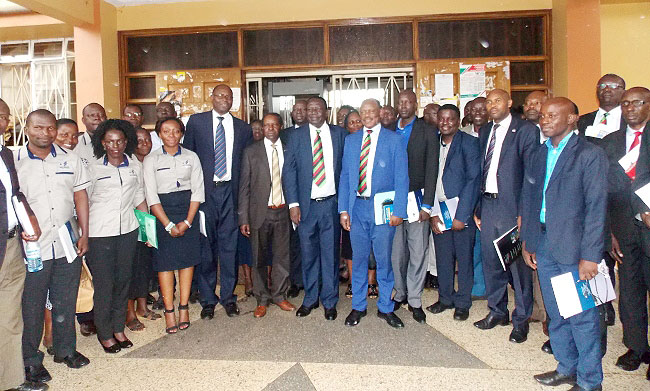The Makerere University Retirement Benefits Scheme (MURBS) has declared a rate of 17% return to Makerere University Staff members which was above their target by three points. This was revealed during a press conference held on Tuesday, 16th October 2018 in the Quality Assurance Tele-presence Centre, Senate Building, Makerere University.
Between 1996 and June 2005, Makerere University operated a Deposit Administration Plan (DAP) with National Insurance Corporation (NIC) with the sole purpose of providing financial security to its staff after retirement. During that time it was discovered that benefits under DAP were not able to provide a decent life to members of staff upon retirement. MURBS was formally constituted and began operations in July 2010. Since inception, MURBS has been audited by leading Audit firms eight times, and is going to have its 8th Annual General Meeting (AGM) on Wednesday, 24th October 2018.
According to Mr. Wilber Grace Naigambi, the Chairperson MURBS Board of Trustees, during the financial year 2017/2018, the scheme paid out benefits amounting to UGX 3.79 billion to 99 existing members compared to UGX 3.22billion in the previous year.

“I am glad to report that during the financial year 2017/2018, we paid out benefits on average within six days. I note with much pleasure the significant progress made by MURBS in the various aspects of its governance and management,” said Mr. Naigambi.
He revealed that rating by the Uganda Retirement Benefits Regulatory Authority (URBRA) after a thorough evaluation indicated that the MURBS Board of Trustees is performing well. “URBRA rated MURBS as the 4th biggest scheme (in terms of assets) in Uganda after NSSF, Bank of Uganda and the Parliamentary Pension Scheme.”
The Vice Chancellor of Makerere University, Prof. Barnabas Nawangwe said that Makerere University Management recognizes the importance of MURBS in the running of the University as it provides employees with an opportunity to assess their financial position in their working life.

“I am happy to learn that some of our staff currently have retirement benefits in excess of Uganda Shillings 200million. This has made the work of the University management easier,” said Prof. Nawangwe.
Prof. Nawangwe pledged that the University Management will continue working with MURBS to further consolidate all these achievements and reassure staff that Makerere University takes good care of its own upon retirement.
Eng. Dr. Charles Wana-Etyem, the Chairperson Makerere University Council said that Makerere University is building for a vibrant future retirement benefits sector through MURBS. He added that the 17% return MURBS has awarded to its members is going to translate into enhanced savings of Makerere University staff upon their retirement.

“Retiring staff now have a far higher financial security than it was previously. I wish to thank the University Management for nurturing this scheme and ensuring that monthly contributions are remitted promptly,” remarked Eng. Dr. Wana-Etyem.
The Secretary Board of Trustees, Dr. John Mulindwa Kitayimbwa, noted that all permanent staff are eligible members of the scheme, and MURBS has 15 policy documents that guide the flow of work, thus ensuring good governance. He revealed that the scheme is embarking on training Makerere University staff on how to appropriately use their retirement benefits.
MURBS is run as a fully transparent retirement benefits scheme that is fully compliant with all regulatory requirements. It intends to uphold this by laying a firm institutional foundation for its governance and management systems. In so doing, MURBS has raised the bar on transparency in Uganda’s retirement benefits sector.
Article by: Angom Pauline, Rachael Kanyi and Esther Joyce Nakibombo, Communication Volunteers-PR Office

 General2 weeks ago
General2 weeks ago
 Natural Sciences2 weeks ago
Natural Sciences2 weeks ago
 Agriculture & Environment1 week ago
Agriculture & Environment1 week ago
 Health2 weeks ago
Health2 weeks ago
 Health2 weeks ago
Health2 weeks ago






